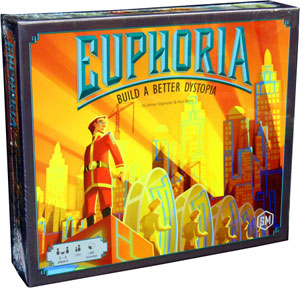



play board games
Board game reviews, strategy tips & session reports
Euphoria Build a Better Dystopia Review
 Stats:
Stats:
No. of players: 2-6
Amount of time to play: 60-90 min
Age requirements: 13+
Set-up time: 5 min
Euphoria is a worker placement game that uses dice as workers. You must gather resources and commodities, build markets and place your authority tokens. The first player to place all ten of their authority tokens wins.
Euphoria Rules Description:
You start Euphoria with two workers, two recruits and a dilemma card. One of your recruits starts face up and one is face down. You can flip the face down recruit later in the game. You recruits give you special abilities that help you in the game.
You also start your workers with one morale and three knowledge. These are tracked on the board. Morale determines your hand size for artifact cards and knowledge represents how much your workers’ awareness of their situation. Different actions cause you to gain knowledge or morale.
To start the game you roll your two workers. The player with the highest total goes first. On your turn you place a worker or retrieve any or all your workers from the board.
When you place workers on the board they can go most anywhere. Some spots get you commodities like energy, water, food or bliss. While other spots get you artifact cards, let you place authority tokens or build markets. If you have two or more workers with matching values you may place them all on separate spots on the same turn. Other than that the facing of your workers only matter on commodity spaces where the total value of all workers there determines how many commodities you get. Some spots allow for only one worker to be there but they can be bumped. When bumped these instantly return to their owner.
Any time you retrieve workers, whether for your turn or when they are bumped, you instantly roll them. If the total of your unplaced workers plus their knowledge (as marked on the knowledge track) is greater than fifteen you lose a worker. This represents your workers becoming aware enough of their situation that they run away.
Markets require resources to build. You gain resources by spending commodities. After a market is built it all players that helped build it may place an authority token there. Players that did not help build that market suffer a penalty the rest of the game or until they discard three artifact cards (or two matching ones) to place on of their authority tokens on the market.
There is also an allegiance track that has the four factions from the game. These match the factions your recruits are from. Certain spots in the board let you move the token on one of the corresponding faction’s track. Once the token is far enough along it will grant players with recruits from that faction special abilities. This includes gaining more commodities, resources or cards and flipping your hidden recruit. When the token reaches the end of the track you may place an authority token on one of your matching recruits.
Dilemma cards let you trade a specific artifact card or any two artifact cards to either gain a recruit or place an authority token on it.
Once a player has placed all ten of their authority tokens on the board they are the winner. If this happens at the same time due to a market or the allegiance track, the player with the most morale wins the tie.
A Quick Review of Euphoria:
Euphoria Build a Better Dystopia is a fun fast worker placement game. You must manage you resources, morale and knowledge well to win this game.
The components for this game are really nice. The art work looks great and the tokens and chits are high quality. The rules are easy to read and follow with plenty of examples. Some people think the board is too busy, but it didn’t really bother me. My only complaint is the box. There is no insert at all and everything just floats around in it. This is not too bad especially since you are given a bunch of baggies for the components.
I like how quick this can move once everyone has a handle on how everything relates. You could still play with someone with analysis paralysis and that would slow down the game as there are lots of choices. But after a couple plays this game should go pretty quickly. The first play or two will take longer as players try to figure out the best way to get their authority tokens on the board.
The workers getting bumped and being able to bump your own workers makes for some strategic placement and interesting decisions. Do you bump someone’s die or not? Do their other available workers have high rolls and do they have high knowledge? Or do you place a worker somewhere so you may bump it the next turn.
How knowledge and morale work is also cool. You must keep your knowledge low or you may lose workers. And while morale is not as powerful it still is important (especially for placing authority tokens).
Euphoria feels like a race. Once a few authority tokens hit the board it feels like more are being placed each round. This is exciting and builds tension unless you are out of the game already. Whether it is because of weaker recruits, having the lone recruit in a faction and thus not having their allegiance track progress, or bad luck when retrieving your workers, it is hard to recover. Since nothing blocks your opponent’s workers it is really tough to slow another player down. And even if you can a bit, it usually just to their detriment, not to your gain.
My group also felt the theme was hit and miss. Some players thought it made sense while others felt it was tacked on. I can see both sides and certain aspects seem to make sense in the theme while other do not. This does not make or break the game for me.
Euphoria is a beautiful, worker placement game that is quick and easy to play once you are used to it. It plays up to six which is nice for this board game genre. If you enjoy worker placement games or are looking for a quick one to add to your collection, you should try this one out.
Score and synopsis: (Click here for an explanation of these review categories.)
Strategy 4 out of 6
Luck 3 out of 6
Player Interaction 3 out of 6
Replay Value 4 out of 6
Complexity 4 out of 6
Fun 4 out of 6
Overall 4 out of 6

Leave a Reply